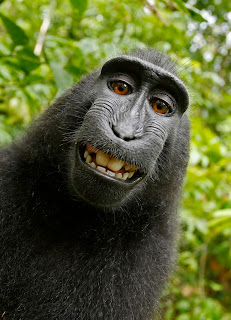Monkeys Lack Standing to Sue for Copyright Infringement – 9th Circuit Rules on ‘Monkey Selfie’ Case

On April 23rd the long dispute over the infamous ‘monkey selfie’ (covered here, here and here), which was taken by a Macaque monkey, named Naruto, has finally been decided. Following PETA’s complaint in 2015 where the organisation had requested to have any profits that will be gained from the photo taken by Naruto should go to the monkey and preserve its habitat, last year in July the Ninth Court has heard the parties’ arguments. Subsequently, two months later the parties have reached the settlement and filed a motion to dismiss the case but the motion was denied by the court.
The Ninth Circuit Court of Appeals held that the monkey, which was named as the plaintiff, lacked statutory standing to bring an action for copyright action under the Copyright Act. Neither it was possible for PETA to validly assert ‘next friend’ status that would allow it to represent the monkey “both (1) because PETA has failed to allege any facts to establish the required significant relationship between a next friend and a real party in interest and (2) because an animal cannot be represented, under our laws, by a ‘next friend’”.
Bulgaria was one of the four countries which have failed to pass the laws that will fully implement EU Collective Rights Management Directive (Directive 2014/26/EC). On 7th December 2017 the European Commission said it will refer Bulgaria to the Court of Justice of the EU and request a fine of €19,121.60 per day for failure to transpose the Directive which the country was supposed to enact by April 2016. The main aim of the Directive is to improve the operation of collective management organisations and set common standards for the multi-territorial licensing of rights for musical works that are distributed online.
In light of the Directive, Bulgaria has recently passed several amendments to is Copyrights and Neighbouring Rights Act. The new provisions will now allow non-profit organisations and other commercial legal entities (independent companies) to conduct the collective management of copyrights. In order to do so, independent companies will have to enter into a separate agreement for copyright management with the rightholders and register in the Rights Management Organisations Register at the Ministry of Culture. Furthermore, amendments introduced to the Copyrights Act regulate the responsibilities of the parties in the event of live performances, shift the control of copyright compliance to municipalities and provide the Minister of Culture with a power to oversee the collective management of rights.
Several major Hollywood studios, including Disney, Paramount Pictures and Warner Bros, together with Netflix and Amazon, have formed a new (another?!) anti-piracy partnership, Alliance for Creativity and Entertainment (ACE), and have brought an action against Set Broadcast LLC, seller of the popular IPTV service SET TV. Following their actions against Tickbox and Dragonbox devices, members of ACE have filed a complaint against Set Broadcast accusing it of facilitating mass copyright infringement. In the view of the Plaintiffs, the software offered by Set Broadcast allows its buyers to stream copyright infringing content. As stated in the complaint, “Defendants market and sell subscriptions to “Setvnow,” a software application that Defendants urge their customers to use as a tool for the mass infringement of Plaintiffs’” copyrighted works. Additionally, Defendant invites its customers to download and install the software on their portable devices and computers. Apart from the software the company also offers preloaded boxes which enable their users to watch ‘on demand’ content and live streams of TV Channels. Plaintiffs claim that “[f[or its on-demand options, Setvnow relies on third-party sources that illicitly reproduce copyrighted works and then provide streams of popular content”. Therefore, ACE members are claiming in their action statutory damages and seeking an injunction to close the service and seize all the devices that are in Defendant’s possession. ACE spokesperson said that piracy software such as ‘Setvnow’ impair films and TV shows market, and cause harm “to a vibrant creative economy that supports millions of workers around the world”. Therefore, ACE is committed to “protecting creators and reducing online piracy through dedicated actions against illegal enterprises”.
Earlier this year in February, director Christian Charles has filed a complaint in the Southern District of New York alleging comedian Jerry Seinfeld, together with companies involved in the production of the Comedians in Cars Getting Coffee web series. Charles claims that he has come up with the concept of the series and although he created the pilot episode, he is now out of the production, and royalties, as well as profits in violation of his copyright. In response to the lawsuit, (as reported by IPWatchdog), on April 4th Seinfeld filed a memorandum to support the motion to dismiss the case. He asserts that the copyright claim should be dismissed for being time-barred given the claims were filed after the expiration of the statute of limitations. In the situation, where the Court finds the claims cannot be dismissed on the time limit basis, Plaintiff’s claims should be dismissed on the basis that they fail to provide a protectable copyright interest. In the view of Seinfeld and others, the concept of comedians in cars that has been followed by similar concepts such as Carpool Karaoke and Cougars in Cars Getting Cosmos, which “consists of nothing but ‘common stock ideas’ and unoriginal scènes à faire that do not rise to the level of original protectable expression”. Additionally, the Defendants claim that Charles has fraudulently obtained his copyright by registering similar title “designed to mislead the Copyright Office into accepting a copyright application that directly conflicted with the one filed by Mr. Seinfeld.”
 In the previous CopyKat [look here] we have looked at the dispute between Solid Oak Sketches and Take-Two over copyright infringement of tattoo designs. During the last week, a new lawsuit has been filed which addresses the issue of tattoo’s copyright protection. In her action against WWE and 2K Gamers, tattooist, Catherine Alexander who inked WWE wrestler Randy Orton argues that her designs were used in a commercial manner without her consent. Similarly to the NBA2K game, here video games from WWK2K series prominently feature Orton’s multiple tattoos in digital designs. According to Alexander, the games display Orton’s tattoos in a manner that is same or substantially similar to her copyrighted works. The question that the Court will have to answer, as indicated by Forbes, will be whether WWE and 2K Games have actually copied the work and whether there is a similarity between Alexander’s protectable designs and works in the video games. In the view of Alexander, “there is no doubt that her designs have been ripped off and reproduced in an effort to make them seem as close to real-life as possible”.
In the previous CopyKat [look here] we have looked at the dispute between Solid Oak Sketches and Take-Two over copyright infringement of tattoo designs. During the last week, a new lawsuit has been filed which addresses the issue of tattoo’s copyright protection. In her action against WWE and 2K Gamers, tattooist, Catherine Alexander who inked WWE wrestler Randy Orton argues that her designs were used in a commercial manner without her consent. Similarly to the NBA2K game, here video games from WWK2K series prominently feature Orton’s multiple tattoos in digital designs. According to Alexander, the games display Orton’s tattoos in a manner that is same or substantially similar to her copyrighted works. The question that the Court will have to answer, as indicated by Forbes, will be whether WWE and 2K Games have actually copied the work and whether there is a similarity between Alexander’s protectable designs and works in the video games. In the view of Alexander, “there is no doubt that her designs have been ripped off and reproduced in an effort to make them seem as close to real-life as possible”.  In 2017 China’s Internet Copyright Industry Grew by Over 27%
In 2017 China’s Internet Copyright Industry Grew by Over 27%
In a recently released report, The National Copyright Administration of China reveals that its internet copyright industry grew by over 27% last year and has reached over 636 billion yuan, (US$100 billion). The biggest contributors are online news portals and online games which account for 73% of the total market value. In 2017 online news and information market grew by 40%, whereas online gaming increased by 32% and reached 235.5 billion yuan. Live streaming and short videos over the past two years have seen the most rapid growth, achieving a number of 422 million live streaming users. Mr Zhang Qinkun, Secretary-General of the Internet Copyright Industry Research Center, in observing prospects in the industry for the coming years said that businesses should concentrate on improving the quality of their content in order to attract users.
At the same time, the National Office for the Fight Against Pornography and Illegal Publications revealed in its report that China has dealt with over 460 cases in the first three months of the year that involved copyright infringement. According to the National Office, in connection with the cases more than 1.5 million illegal publications, such as e-books, videos and games were confiscated.
The Swedish Patent and Registration Office (PRV) has created national aggregator called Streamalagligt.se (‘stream legally’), which aims to promote legal streaming among Swedish citizens. The platforms allow for searching of copyrighted works, such as films, TV shows, music, and sports events providing a single access point to find legal digital content. Streamalagligt.se is part of agorateka, portal of the European Intellectual Property Office (EUIPO) that intends to raise awareness and allow the search for legal content through national-level portals. Through the creation of its portal, Sweden joins 14 other EU countries that already have aggregator websites as part of agorateka programme.
This update by Mateusz Rachubka








